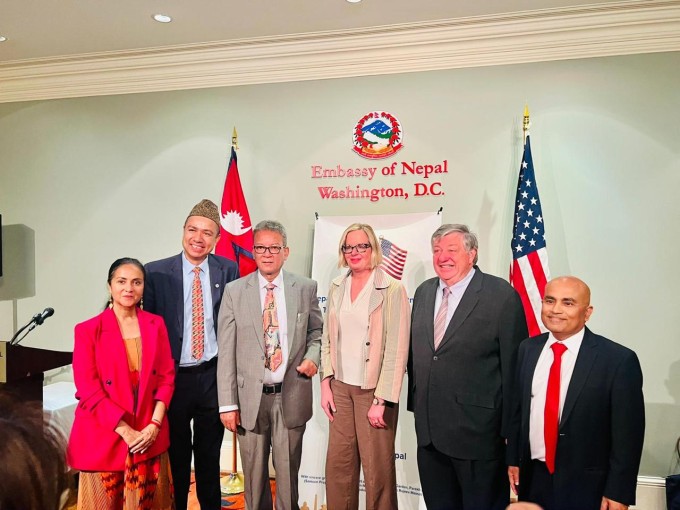Chris Martin admits that Coldplay’s latest album could have sounded terrible if it wasn’t for one person — mastering engineer Emily Lazar.
Like the musical magician she is, Lazar added her special touch to the band’s eighth album “Everyday Life,” which was released in late 2019 and is now competing for the top prize at the 2021 Grammy Awards.
Martin describes the universal and political album as “a patchwork quilt of opinions and thoughts about life and humans and the planet and how much we love Nigerian music and how much we love gospel (music) and how much we love, like, old-fashioned, northern European church music.”
“All these weird things and sampling from voice memos — in the wrong hands it could have sounded awful.”
Lazar came in to save the day — a role she’s played on thousands of albums and a reason she’s making history at this year’s Grammy Awards.
For her work on Coldplay’s album, she shares a nomination with Martin and friends for album of the year. Lazar is also the mastering engineer on HAIM’s “Women In Music Pt. III” and Jacob Collier’s “Djesse Vol. 3” — both nominated for album of the year — making Lazar a triple nominee in the Grammys’ biggest category.
“You kind of go into a little bit of shock after the first one. You’re not even focused for the next one because you think, ‘That’s it.’ By the time we got to the third one, I almost had to check myself and say, ‘Why are they listing all the records that I worked on?’” Lazar said in a phone interview.
Lazar, 49, made history at the 2019 Grammys when she became the first woman to win best engineered album (non-classical) for her work on Beck’s “Colors.” She was the first female mastering engineer to ever be nominated in the album of the year category for her role on Foo Fighter’s “Wasting Light” and she’s the only female mastering engineer nominated for album of the year this year, though engineer/mixers Laura Sisk and Jasmine Chen are competing for their roles on Taylor Swift’s “folklore” and HAIM’s third album.
“If someone has achieved that in one go, it’s clear proof that they bring something special,” Martin said of Lazar’s record three nods for album of the year. “Recorded music is always followed behind technology. The people that know how to, first of all invent and secondly master that technology, are as worthy of attention and praise as the artist themselves because we can’t exist without the people that invented recording and invented the piano.”
He added: “Emily is a technician, but she’s very much a musician’s technician. She knows everything about the technology but is always in service of the song or the piece. And that’s hard to find. I don’t know how to switch ProTools on, for example. And some technicians don’t know whether the chorus is good or not. Emily sort of bridges those two worlds so beautifully.”
Like many touring musicians and those behind-the-scenes, Lazar started her career in front of the scene as a rock-pop singer-songwriter. But she grew frustrated in the recording studio, feeling like her voice was being silenced from engineers when she had thoughts about how a song should sound.
“There was a weird invisible fence between engineers and artists, and it wasn’t inviting, especially as a woman, to be asking questions about how to make things sound a particular way. The assumption was that you were just the artist and you’d show up and you’d do stuff and you wouldn’t get to have a say,” she said.
And, of course, she was just one of two women in the room.
“There were certainly no other women on the technical side. I did have a female bass player in my band, finally, at one point. I did have a little girl power. It wasn’t enough to go against the entire sea of (men). It was rough. It was a lot of interesting behavior. It only inspired me to work harder to figure it all out.”
She went on to get her master’s degree in music technology and cut her teeth at a music engineering firm where she “learned a lot about how I didn’t want to run a company.”
The mastering engineer’s role on most albums comes at end of the album-making process, “putting that final audio polish on an album,” as Lazar describes it. But Lazar always thought differently, and as a freely creative musician and thinker, she wanted to collaborate with artists while they were making their albums.
“I learned exactly how to create an environment that felt really comfortable to me as an artist and as an engineer, which I thought would be really comfortable for other people,” said Lazar, who launched her Manhattan-based company, The Lodge, at age 25.
“I kind of felt like what I wanted to do didn’t exist. I also felt this feeling that if I didn’t do it, I didn’t really know who would. I really did do it differently. I didn’t think anyone was going to change it. There were no other women and there was no other idea of making a creative collective. It was more of this sterile, weird environment. It was more like a dentist office with rooms and leather couches. It didn’t feel right.”
“I took a lot of heat for that originally in the old-school,” she said. “The old-school vibe was, ‘Is this woman crazy?’ I don’t know if they called me a woman. They may have said something more derogatory. ‘Why is she touching that? That’s not her job. Her job is just to do this.’ Now I think the boundaries have blurred a bit. I know there are moments where I’ve been able to jump in and save the day for people.”
Lazar has mastered more than 4,000 albums throughout her career, including releases by Björk, David Bowie, Sia, Wu-Tang Clan, Barbra Streisand, the Chainsmokers, Dolly Parton, Lou Reed, Destiny’s Child, Depeche Mode, Alanis Morissette, Vampire Weekend, Little Big Town, Morrissey, Natalie Merchant and Tiësto.
She reached new heights when she worked as the mastering engineer on The Rolling Stones’ 2020 vinyl reboot of “Goats Heads Soup” as well as the 50th anniversary release of the Beatles’ “Abbey Road,” released in 2019.
“You can’t think of anything more important to the rock ‘n’ roll cannon than the Beatles and the Rolling Stones,” she said. “I feel incredibly humbled and blessed to have gotten to play a part in that.”
While she’s elevated in her musical career, Lazar knows it’s important to help bring up others, especially women and minorities in a field dominated by white men. She’s participated in programs like She Is the Music and Women’s Audio Mission because she knows the importance of representation.
“I believe that you should work with the best (engineer) for what you’re trying to do: male, female, gay, straight, Black, white, green, whatever. It doesn’t matter to me as long as they have the right creative vibe to what you’re trying to do. It shouldn’t actually matter. Until everyone has a seat at the table, we do have to make an effort to pull the chairs out for some people to get in there to have some dinner,” she said. “No one did for me, but I would like to help that happen.”
“I could tell you lots of terrible stories, but I think that focusing on the terrible stories doesn’t necessarily — it may ruin some people’s lives that were total jerks, whether they were aware of it or not,” she continued. “There are moments that I would love to out some of those people, but my inner voice says that it’s really more important to make sure these things don’t happen by creating environments that are more amenable to equality and equity on every level.”







